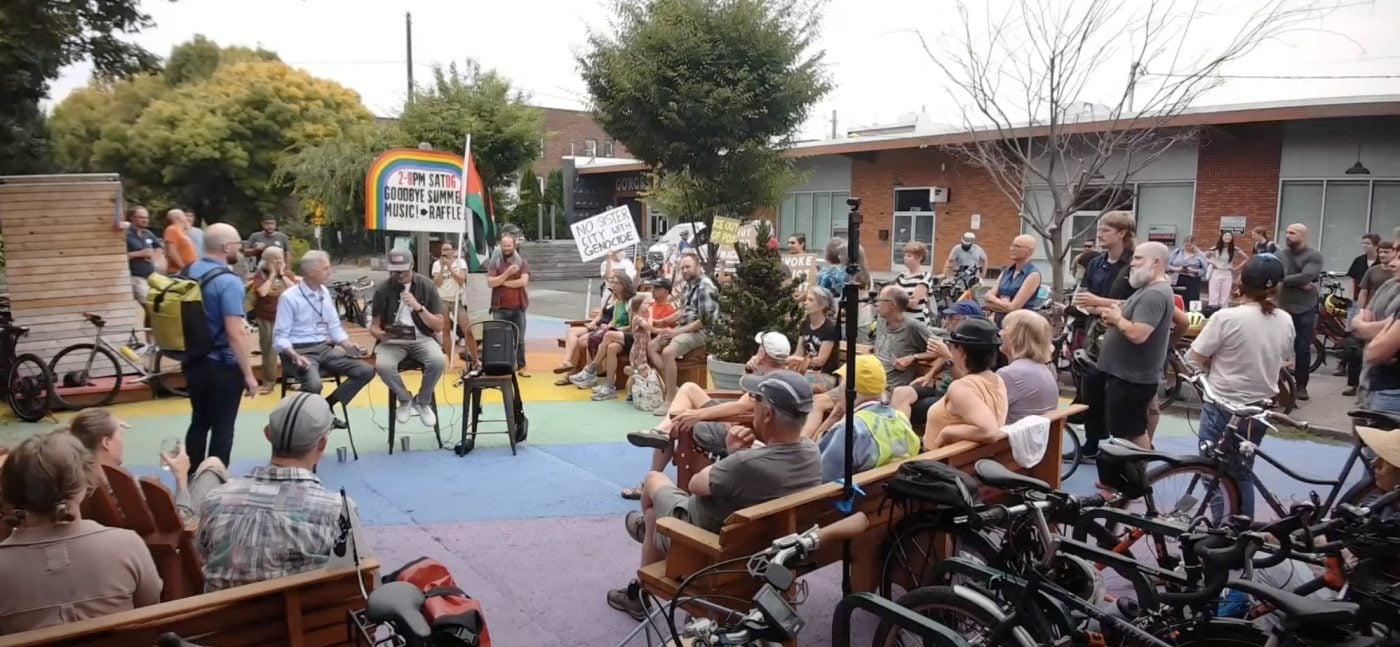
Last night at Bike Happy Hour I expected to sit down in Rainbow Road Plaza and interview Mayor Keith Wilson. We did sit down, along with a huge crowd eager to hear an unfiltered, unedited conversation with their mayor; but the interview didn’t happen. Several local groups heard about the event and decided to use it as a platform to express their grievances with the mayor. They also didn’t think an event about cycling and transportation politics should happen while their issues are not being adequately addressed. When the situation got heated as folks waiting for the interview confronted protestors, Mayor Wilson decided to leave and we never got an opportunity to talk.
When I first saw “Free Palestine” groups show up with their table, signs and flags, I didn’t make much of it. I know several of the folks involved (they used to be active in cycling activism) and I respect them. I figured they were smart to get visibility for their issue with the mayor. A few of them placed Palestinian flags and a sign that read, “No Sister City with Genocide” (in reference to the City of Portland’s Sister City relationship with Ashkelon, Israel, a city just 12 miles north of Gaza) right behind the chairs where the mayor and I would sit for the interview. At this point, the mayor had not yet arrived.
Upon realizing the flags and sign would be in the livestream shot, Mayor Wilson’s Deputy Chief of Staff Taylor Zajonc approached me to say he would call off the interview unless they were moved out of the video frame. Zajonc made it clear I would have to ask the protestors to move the flags. So I did. After a brief chat, they agreed to move the flags and sign off to the side.
Before Mayor Wilson arrived, I held an open mic as is tradition at Bike Happy Hour. All types of folks stood up to talk — including several of the protestors (see below). They used that opportunity to tell the crowd what they believe and why they were there.
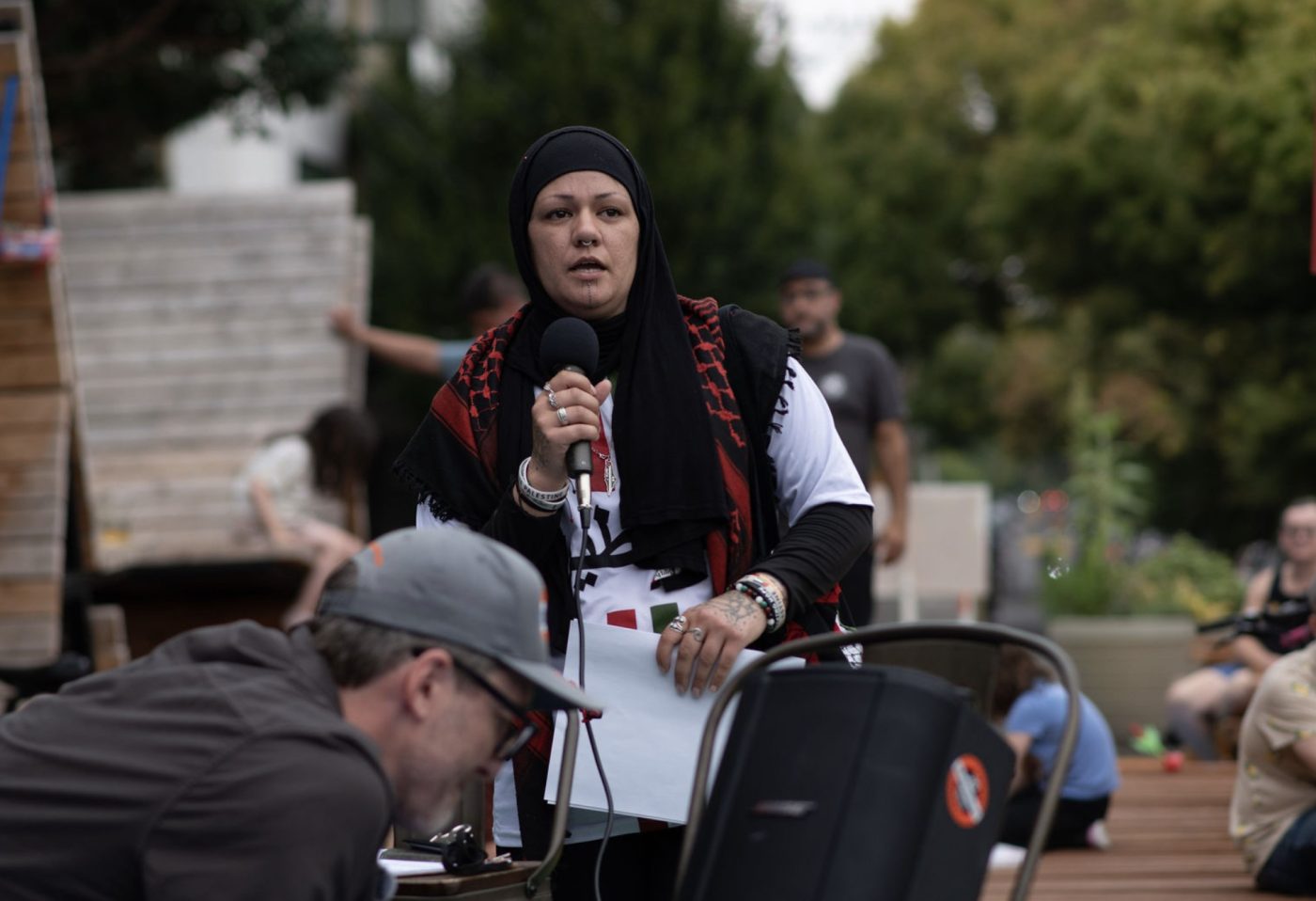
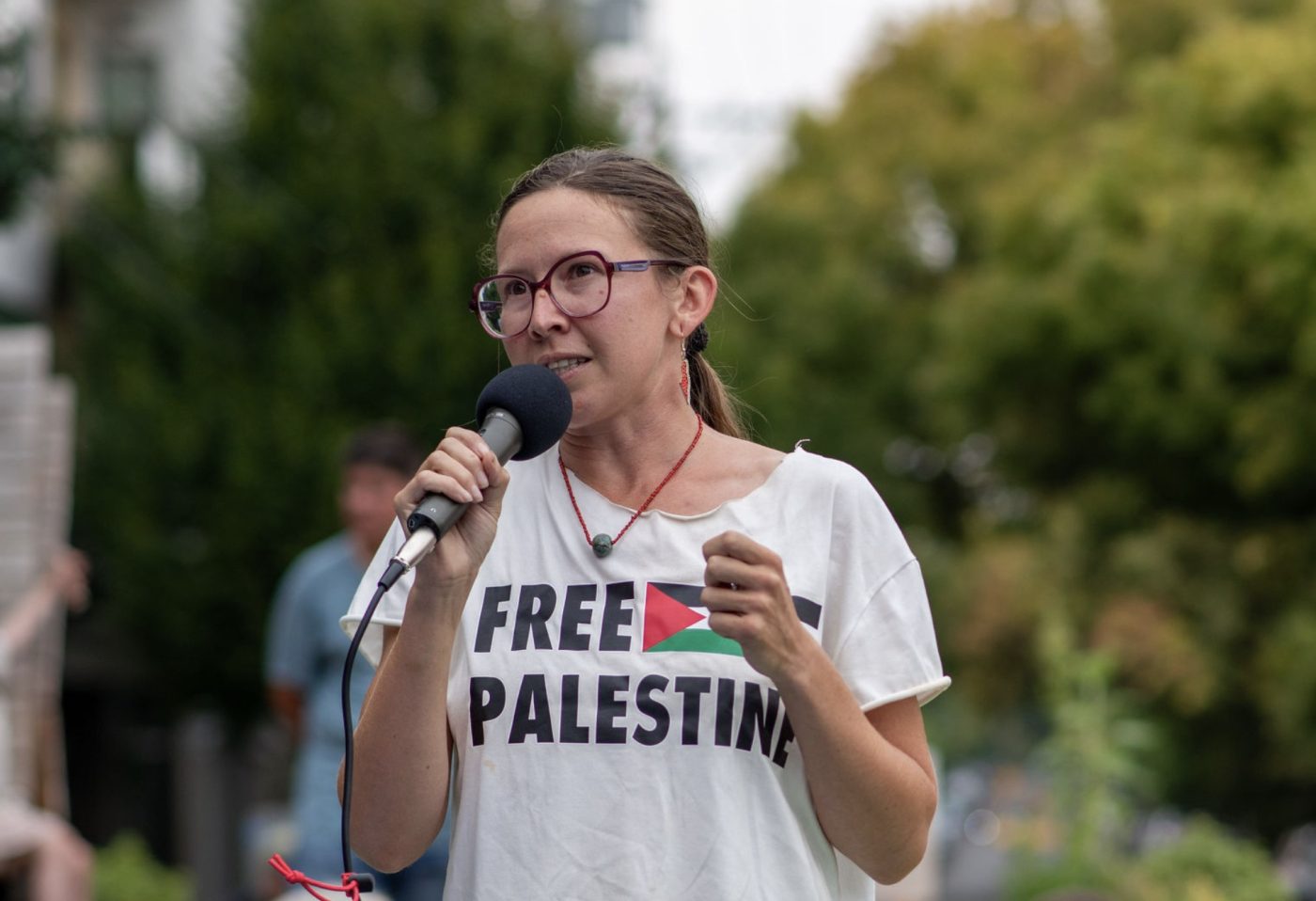
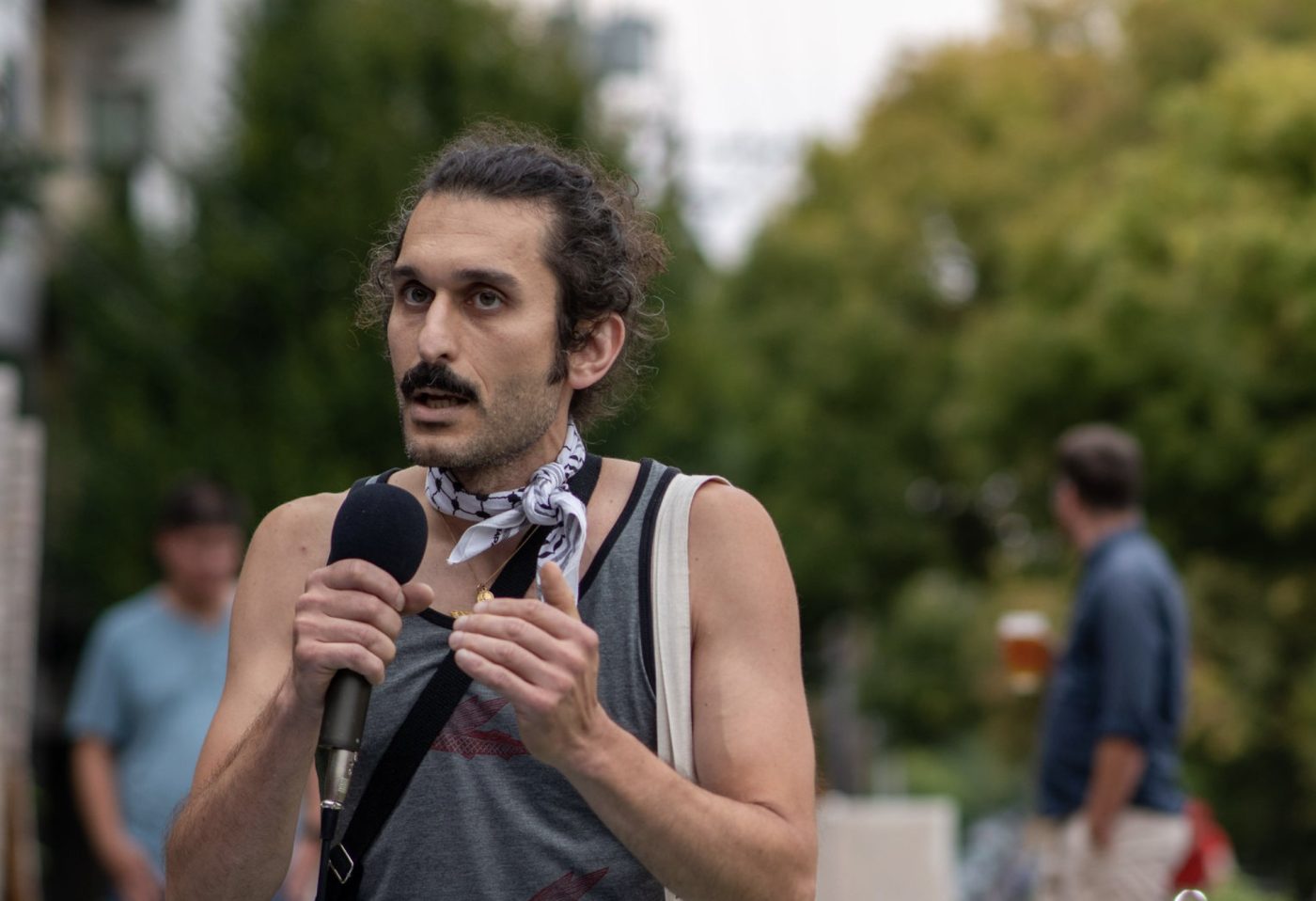
By the time Mayor Wilson sat down and we began the interview, a few other groups showed up. One of them is focused on protesting the ICE facility in South Waterfront, the location of nightly battles with federal agents. One of them had a megaphone and several others were yelling at the mayor. They said he hasn’t been responsive to their concerns and they wanted answers. Free Palestine protestors also began to yell at the mayor and the crowd. They shouted things like, “Bike lanes aren’t as important as genocide!” and they said anyone wanting to hear the interview and who didn’t do more to support their issues were white supremacists.
As the minutes wore on, several folks from the Bike Happy Hour crowd got up and confronted the protestors. I saw some shoving and heard glass breaking. One of the protestors contacted me after the event saying they were treated aggressively and that folks grabbed their signs and intentionally damaged their megaphone.
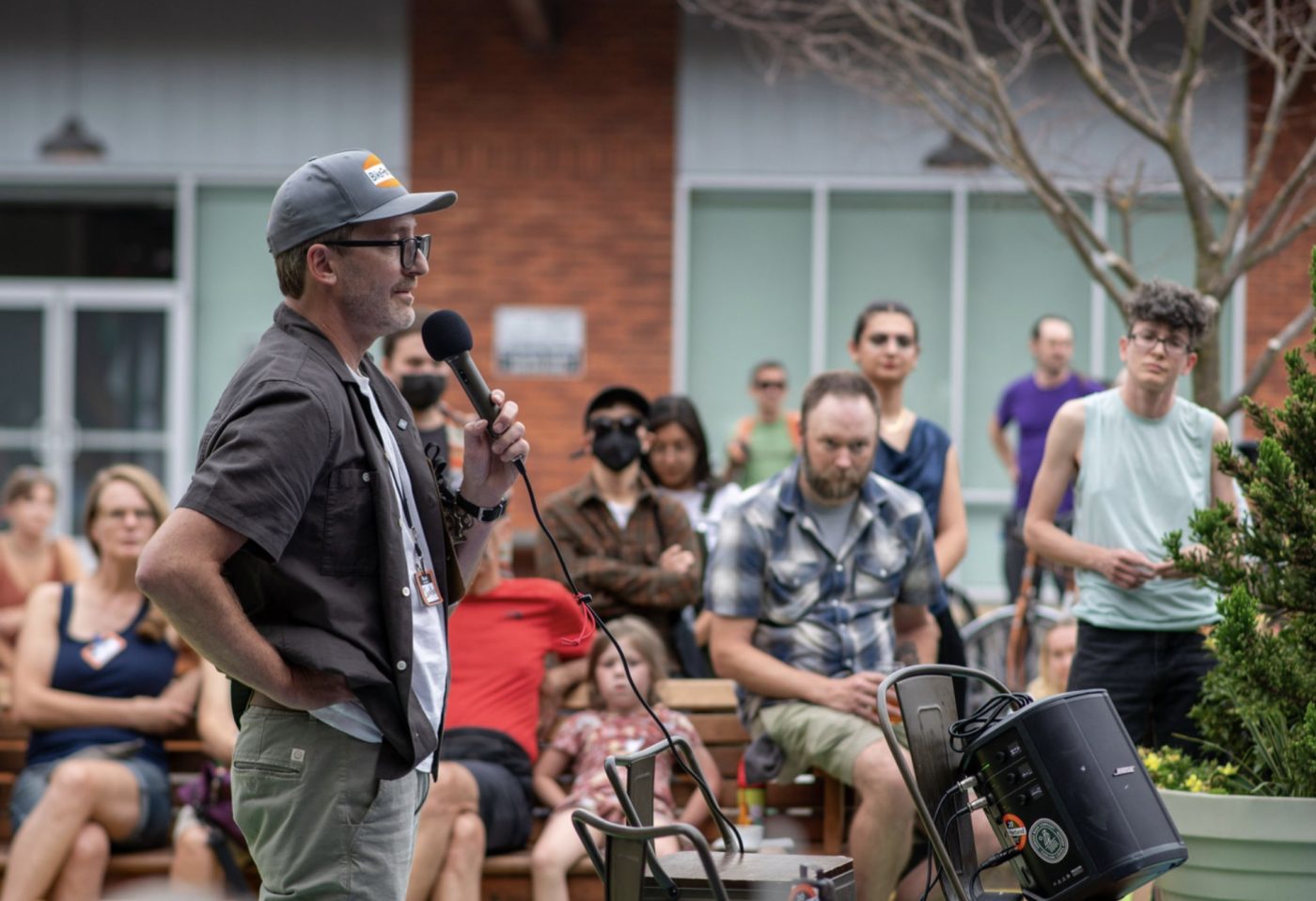
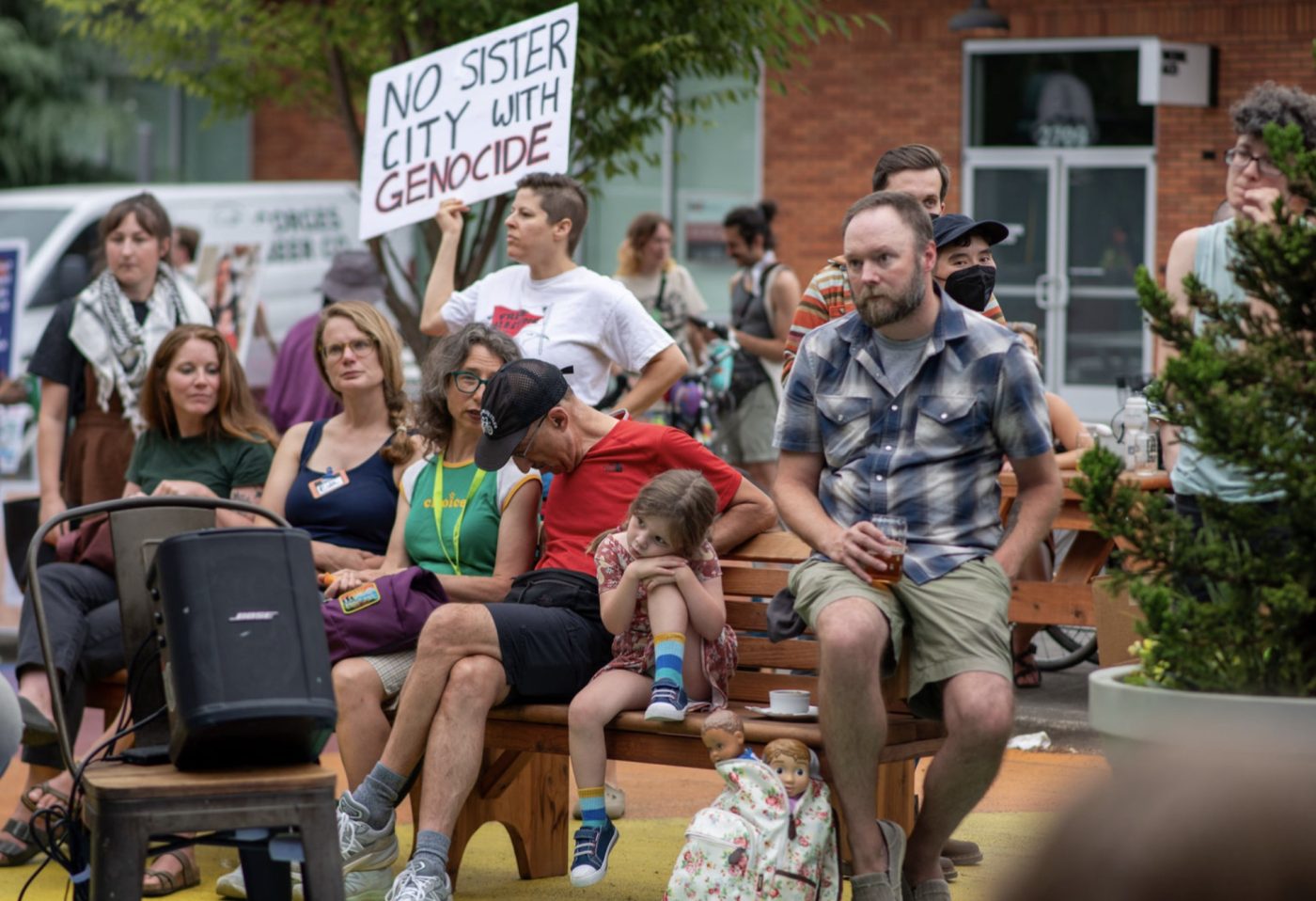
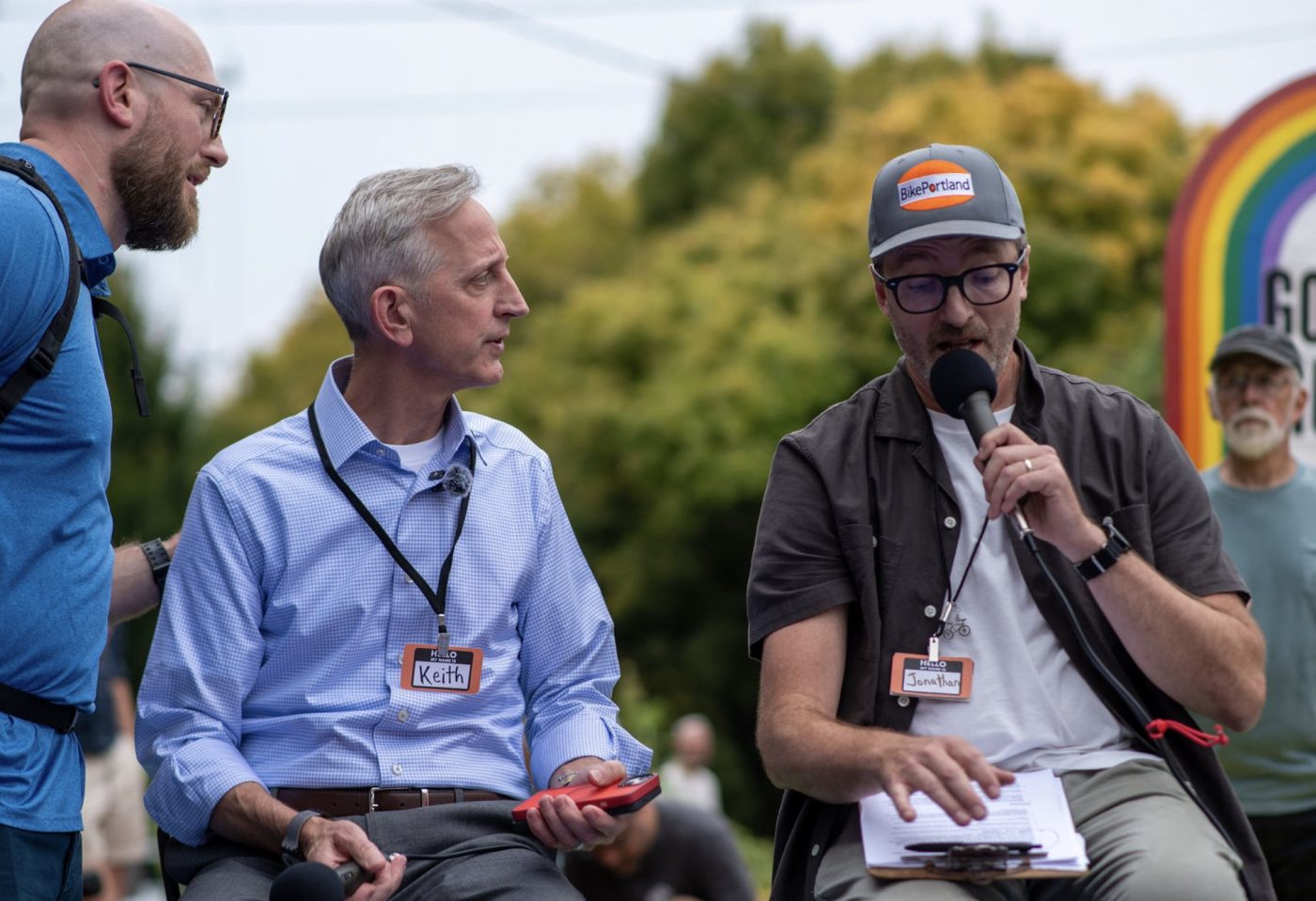

As all this happened, I acknowledged the protestors and gave them time to make their points and to be heard. At one point I tried to just start the interview over the yelling, but it was clear after a few seconds that wouldn’t work. Mayor Wilson was whispering to me that we could find another venue some other time. At one point he said he’d answer the protestors’ questions if they asked during the audience Q & A. That didn’t go over too well, because they wanted answers right then and there.
Ultimately, I think the mayor felt the situation would cool off quicker if he left, so he did.
That’s how I remember it happening. Feel free to correct me if I’m wrong.
I was really disappointed. I’ve worked very hard for many years to get to a place where a mayor would grant me a live interview in a public street that was full of interested and engaged Portlanders. Mayor Wilson knew he’d face hard questions from me and from our audience, but he still showed up. I was eager to flesh out several issues with him in the agora. To have that moment taken away was a bummer. But as the night unfolded, I felt like what happened was just as valuable — if not more so — than a conversation with Mayor Wilson.
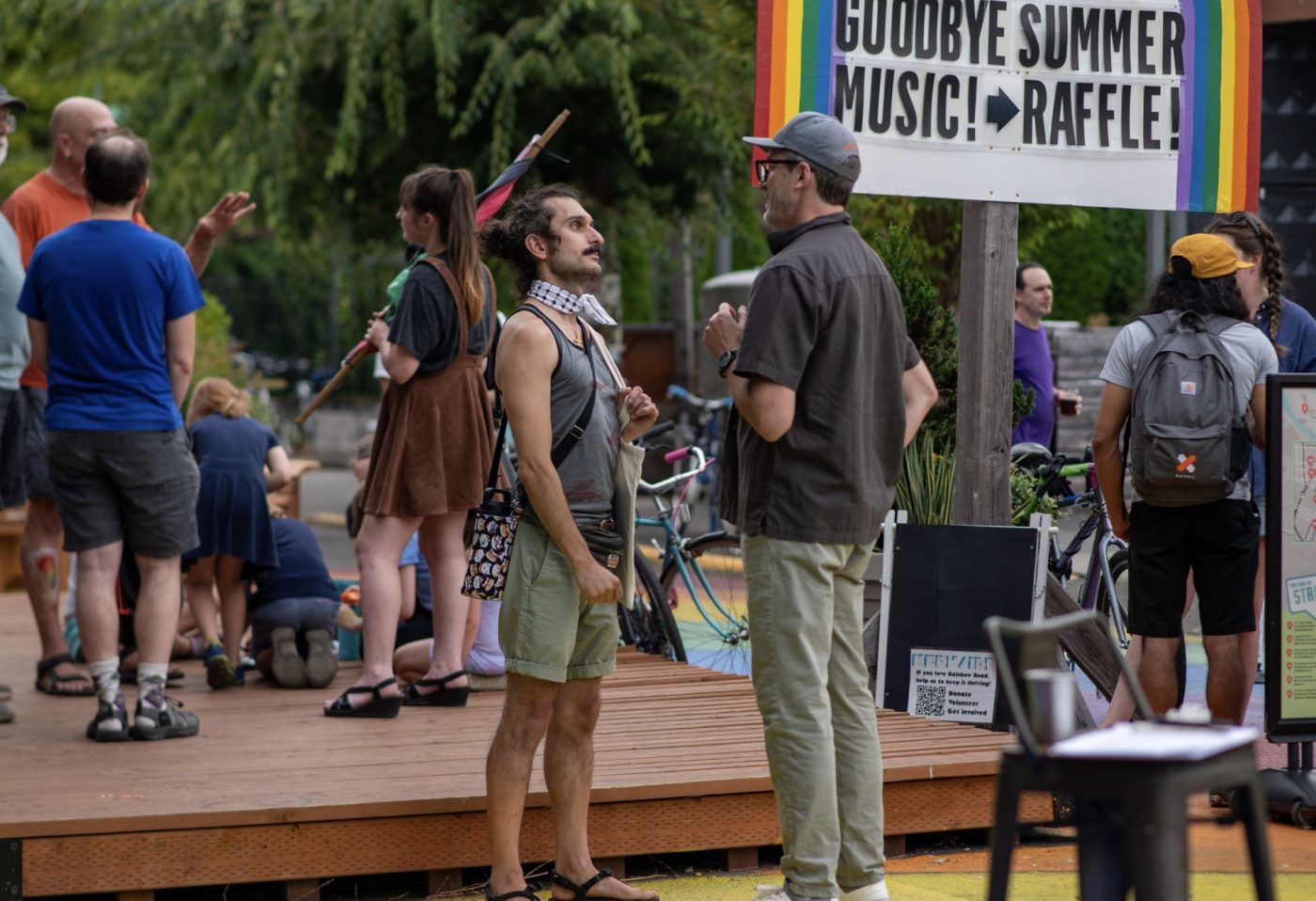
Like I said, I know at least one of the protestors well. He used to be a regular at Bike Happy Hour (we’d even hug sometimes when he arrived!) and was highly involved in bike activism. But as the war on Palestinians became a genocide, he has dedicated himself to fighting for their liberation and humanity. After things cooled off a bit, I spoke with him at length. He explained his frustrations with me and my choices (he thinks I should cover the Palestinian struggle more and use my platform to fight for justice for all people). We talked about how we might work together in the future and what it would look like for more cycling and transportation advocates to learn more about how to fight for human rights and justice for Palestinians — and how Palestinian activists might learn from cycling advocates. From my point of view, it was a mutually respectful and productive conversation.
And as I looked around, he and I weren’t the only ones talking. I saw several folks from the Bike Happy Hour crowd talking with protestors. Groups of people approached me to share their feelings about what happened, and we processed it all, together, in real time, face-to-face. Some of the Free Palestine folks stayed for well over an hour, just talking in the street.
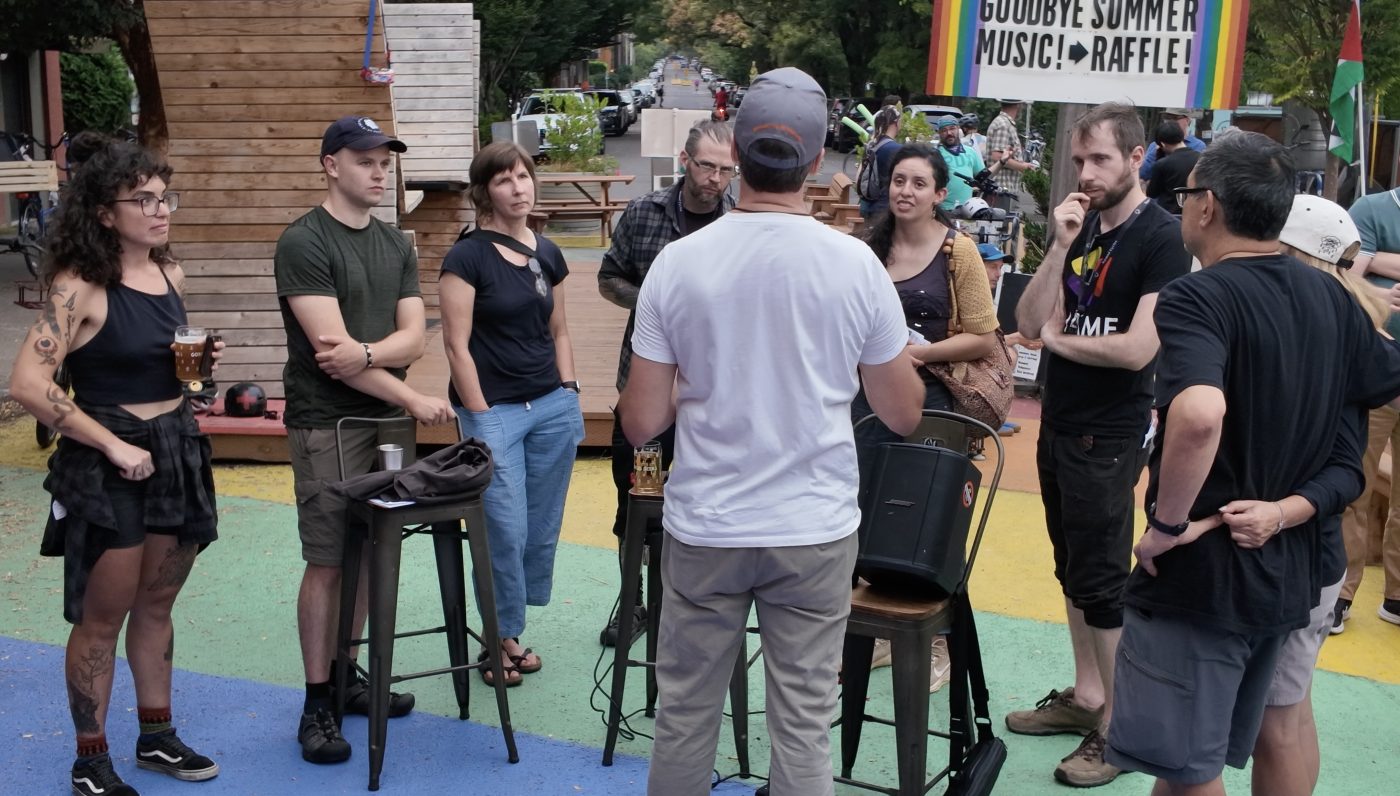
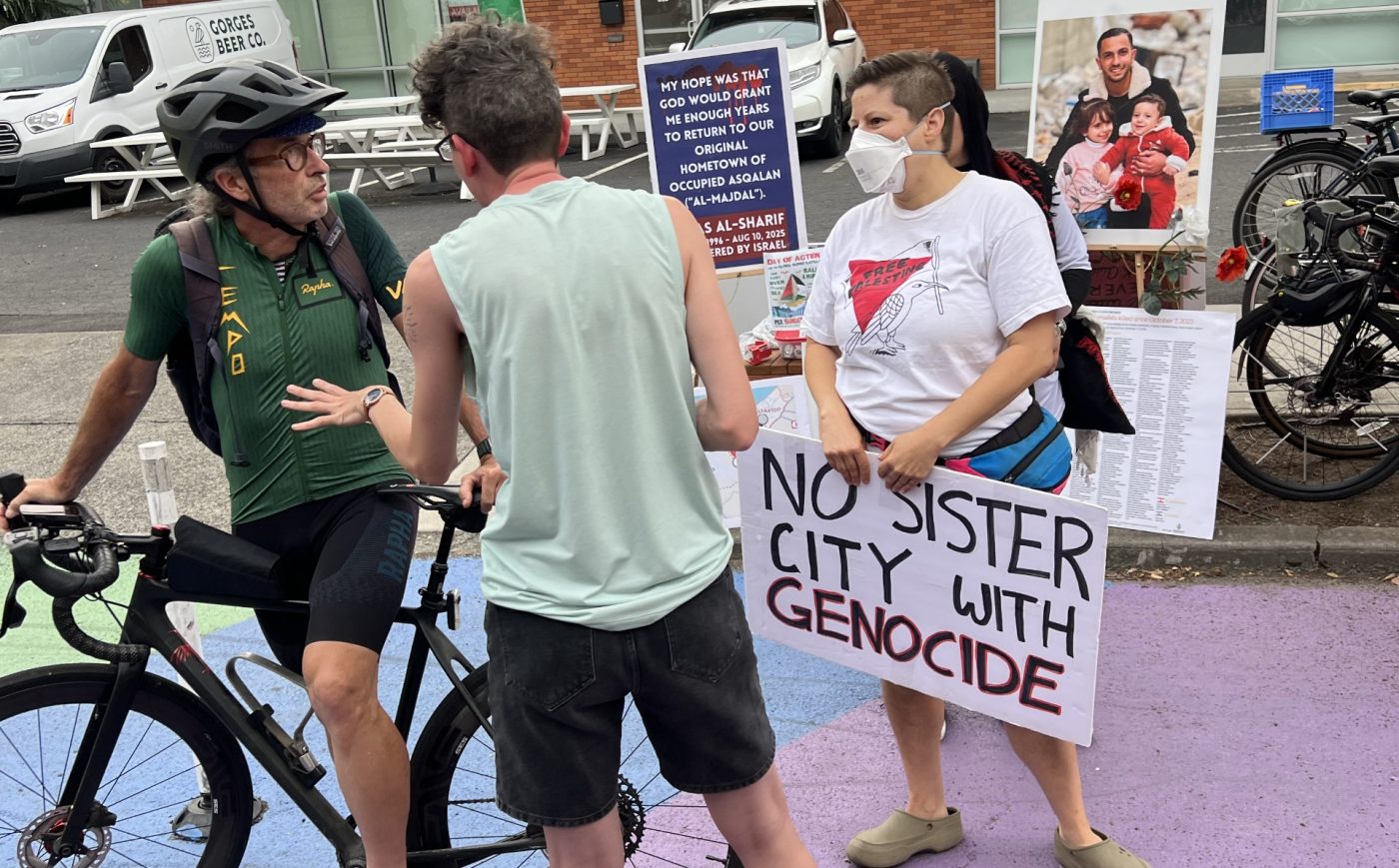
This is what Bike Happy Hour was built for. This is what community is all about! True community-building is not about who you let participate, it’s how they feel when they show up. I don’t believe in picking and choosing who can be a part of our community based on whether or not I agree with them, or if I like spending time with them, or even if they just rub me the wrong way. I feel like if you show up and are open to it, you deserve respect. I have always kept my events and my platform open to as many folks as possible — whether I agree with them or not, and regardless of how they feel about me or BikePortland.
I believe in a big tent and have worked very hard to build one, because we will never have a successful revolution without a lot of people working together! People will make snide remarks about this event from all sides. But to me, this is an example of what makes Portland special. A public, carfree plaza where people with different views can meet and talk to each other, and expose themselves to different perspectives with an open mind and mutual respect.
All this being said, I hope we can find a way to address multiple issues at the same time while not minimizing or detracting from good work being done by others in our community. While these seemingly intractable crises loom (many of them with shared root causes), I believe it’s possible — and vital — for us to work together in a way that supports each other and that makes our entire community stronger. When that happens, imagine the progress we can make.
Thanks for showing up last night. See you next week.
UPDATE, 1:00 pm: Here’s The Oregonian’s take on what happened. Portland mayor abandons bike event as pro-Palestinian, anti-ICE protesters shout him down.
UPDATE, 2:15 pm: Mayor Wilson’s office has shared this statement about his decision to leave:
Mayor Wilson had to leave last night’s Bike Happy Hour event before fully participating, due to protests that made it unproductive and unsafe to continue. We take safety seriously, and the decision was made out of an abundance of caution so the mayor’s presence did not escalate a tense situation.
Mayor Wilson is disappointed not to have shared the evening with community members who came to discuss cycling and street safety. The mayor supports the right to free speech and peaceful protest, and he also believes in the importance of respectful exchange. He had hoped to answer questions, listen, and speak candidly about Portland’s future.
Mayor Wilson remains committed to creating safer streets, expanding access to biking and walking, and engaging directly with Portlanders on issues that matter to them. He looks forward to future opportunities to do so.



